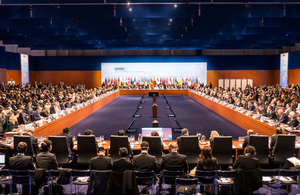United Kingdom statement to the 23rd OSCE Ministerial Council
Statement delivered by Ambassador Sian MacLeod, Head of the UK Delegation to the OSCE on 8 December 2016, Hamburg, Germany.

The Plenary session at the 23rd OSCE Ministerial Council in Hamburg
Mr Chairman, 2016 has not been the ‘calm sea and prosperous voyage’ that the German Chairmanship might have hoped for, but the UK congratulates them on charting a course through some of the world’s most pressing challenges.
The United Kingdom remains strongly committed to the OSCE as an essential pillar of the international rules based system. We continue to support the principles and commitments on which the organisation was founded. These principles and commitments are more relevant than ever. We commend the work that successive chairmanships, the Secretariat and especially our autonomous institutions and field missions undertake to implement them and make them a reality.
Our principles and priorities are being challenged most starkly in Ukraine and it is imperative that these remain the principal focus here at the OSCE. At the heart of this is the Russian Federation’s violation of Ukraine’s sovereignty and territorial integrity starting with the illegal annexation of Crimea. In the east of Ukraine, assisting the parties to reach a sustainable resolution to the crisis remains the OSCE’s most important task. A resolution that upholds Ukraine’s sovereignty and territorial integrity, restores national control of its borders, and brings peace to its people.
To reach this outcome we need safe and unfettered access for our missions and for international humanitarian organisations across the whole of Ukraine; respect for commitments, including those made under the Minsk agreements; and above all, good faith and political will. We urge the Russian Federation to act to bring about an end to the unnecessary suffering.
The OSCE has a unique and vital role in conflict resolution, prevention and reconciliation. I fervently hope that 2017 will see real progress made in efforts to advance reconciliation between communities in Georgia and in Moldova, and to address the differences between Armenia and Azerbaijan.
Our Minister for Europe asked me to mention that when he visited Georgia in November he saw for himself how conflict can divide villages and isolate communities. The UK also strongly supports the continued role of OSCE missions across the Western Balkans in contributing to peace and stability.
Allow me to follow the example of earlier speakers and, in this context, mention that the UK has nominated an excellent candidate for the important role of High Commissioner on National Minorities.
Reducing military risk is also fundamental to our comprehensive and cooperative security. The UK welcomes the fact that Confidence and Security Building and conventional arms control are back on the agenda. But discussion and dialogue are not enough to rebuild trust. We must also modernise and implement our existing instruments.
And security must be underpinned by respect for fundamental freedoms and human rights. Here too the OSCE faces significant challenges. Some states continue to restrict civil society and suppress alternative views.
Security threats, including extremism and terrorism, should not be used to justify abandoning our human dimension commitments. To do so would give fuel to those who espouse hatred and who seek to undermine our approach to tolerance and non-discrimination.
The OSCE’s work to seek agreement on these pressing issues, demonstrates its continued relevance.
It plays an important role in encouraging the political will to resolve conflict, reduce risk, nurture healthy societies and make our region a safer place. It has our full support.